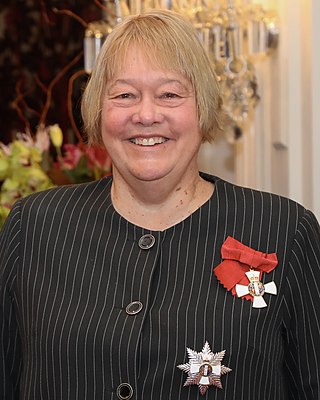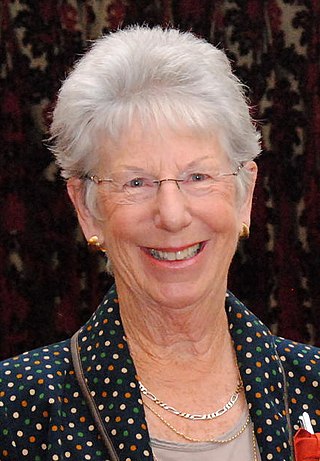Related Research Articles

The Privy Council is a formal body of advisers to the sovereign of the United Kingdom. Its members, known as privy counsellors, are mainly senior politicians who are current or former members of either the House of Commons or the House of Lords.

The Right Honourable is an honorific style traditionally applied to certain persons and collective bodies in the United Kingdom, the former British Empire and the Commonwealth of Nations. The term is predominantly used today as a style associated with the holding of certain senior public offices in the United Kingdom, Canada, New Zealand, and, to a lesser extent, Australia.

Robin Brunskill Cooke, Baron Cooke of Thorndon, was a New Zealand judge and later a British Law Lord and member of the Judicial Committee of the Privy Council. He is widely considered one of New Zealand's most influential jurists, and is the only New Zealand judge to have sat in the House of Lords. He was a Non-Permanent Judge of the Court of Final Appeal of Hong Kong from 1997 to 2006.

The Supreme Court of New Zealand is the highest court and the court of last resort of New Zealand. It formally came into being on 1 January 2004 and sat for the first time on 1 July 2004. It replaced the right of appeal to the Judicial Committee of the Privy Council, based in London. It was created with the passing of the Supreme Court Act 2003, on 15 October 2003. At the time, the creation of the Supreme Court and the abolition of appeals to the Privy Council were controversial constitutional changes in New Zealand. The Supreme Court Act 2003 was repealed on 1 March 2017 and superseded by the Senior Courts Act 2016.

Sir Michael Hardie Boys, was a New Zealand lawyer, judge and jurist who served as the 17th Governor-General of New Zealand, in office from 1996 to 2001.
Sir Douglas Arthur Montrose Graham is a former New Zealand politician. He was an MP from 1984 to 1999, representing the National Party.

Sir David Stuart Beattie, was an Australian-born New Zealand judge who served as the 14th governor-general of New Zealand, from 1980 to 1985. During the 1984 constitutional crisis, Beattie was nearly forced to dismiss the sitting prime minister, Robert Muldoon.

Sir Mark Andrew O'Regan is a New Zealand lawyer and jurist. He was the President of the Court of Appeal of New Zealand until his elevation to the Supreme Court of New Zealand in 2014.

Sir Kenneth James Keith is a New Zealand judge. He was elected to the International Court of Justice in November 2005, serving a nine-year term during the years 2006 through 2015.
Sir Thomas Munro Gault was a New Zealand jurist. He was a Justice of the Supreme Court of New Zealand and a member of the Privy Council of the United Kingdom as well as a non-permanent judge of the Court of Final Appeal in Hong Kong. He was also a justice of the Supreme Court of Fiji.
Sir Edmund Walter Thomas, widely known as Ted Thomas, is a New Zealand jurist. He is a retired judge of the Court of Appeal of New Zealand and a former acting judge of the Supreme Court of New Zealand.

Dame Susan Gwynfa Mary Glazebrook is a judge of the Supreme Court of New Zealand.

Dame Judith Marjorie Potter is a former High Court judge in New Zealand.

Sir William Gillow Gibbes Austen Young was a Supreme Court Judge, former President of the Court of Appeal of New Zealand, and, briefly, a judge of the Dubai International Financial Centre Courts. He was appointed to the Supreme Court by Attorney-General Chris Finlayson in June 2010, taking effect from 1 July.
Sir Noel Crossley Anderson was a New Zealand judge who was President of the Court of Appeal of New Zealand from 2004 to 2006, before being elevated to the Supreme Court. He left office in 2008.

Sir Gordon Ellis Bisson was a New Zealand Court of Appeal judge and a member of the Privy Council of the United Kingdom.

Sir Robert Stanley Chambers was a judge of the Supreme Court of New Zealand.
Sir Andrew Patrick Charles Tipping is a New Zealand jurist who served as a Justice of the Supreme Court of New Zealand from 2004 until his retirement in 2012. He is New Zealand's longest-serving judge, serving on the bench for 25 years. Tipping was also a member of the Privy Council of the United Kingdom. His tenure as a jurist has been widely acclaimed and his contributions to the shaping of New Zealand law are considered to be substantial and permanent.
The Honourable or The Honorable is an honorific style that is used as a prefix before the names or titles of certain people, usually with official governmental or diplomatic positions.
Sir Alan Clifford Perry was a New Zealand lawyer and judge. He served as a judge of the Supreme Court from 1962 to 1979. However, he is perhaps best remembered for taking the case of Lee v Lee's Air Farming Ltd to the Privy Council in 1960, and successfully arguing for the unanimous decision of the Court of Appeal to be overturned.
References
- ↑ "The Judges of the Supreme Court". Archived from the original on 28 July 2012. Retrieved 14 January 2012.
- ↑ "The Supremes – who's who on NZ'S highest court". The New Zealand Herald . 30 March 2005. Retrieved 1 December 2012.
- ↑ "Births". The New Zealand Herald . Vol. 79, no. 24342. 3 August 1942. p. 1. Retrieved 7 September 2022.
- ↑ "Casualty Details: Cyril Francis Blanchard". Commonwealth War Graves Commission . Retrieved 7 September 2022.
- ↑ "Memorial shield for swimming competition". Franklin Times. Vol. 33, no. 121. 25 October 1944. p. 2. Retrieved 7 September 2022.
- 1 2 "Judge honoured by alma mater". University of Auckland. Archived from the original on 20 December 2012. Retrieved 14 January 2012.
- ↑ "Appointment of Judge of High Court" (9 July 1992) 105 New Zealand Gazette 2371 at 2375.
- ↑ "Appointment of Judge of Court of Appeal" (15 February 1996) 13 New Zealand Gazette 421 at 444.
- ↑ "Appointments to the Privy Council" (28 May 1998) 74 New Zealand 1613 at 1644.
- ↑ "The Privy Council". Department of the Prime Minister and Cabinet. March 2023.
- ↑ "Appointment of Judges of the Supreme Court" (20 November 2003) 157 New Zealand Gazette 4333 at 4357.
- ↑ "New Year honours list 2005". Department of the Prime Minister and Cabinet. 31 December 2004. Retrieved 3 September 2018.
- ↑ Special Honours List (12 August 2009) 118 New Zealand Gazette 2691
- ↑ "Special Honours List 1 August 2009". Department of the Prime Minister and Cabinet. 30 December 2006.
- ↑ "Five NZ High Court Judges Sworn-In to Assist Samoa's Bench". Samoa Global News. 14 August 2021. Retrieved 14 August 2021.
- ↑ "ADGM Judges".
- ↑ "ADGM Courts".